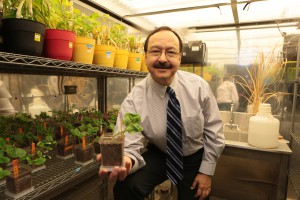
The U.S. Department of Agriculture (USDA) is investing more than $5.2 million to support nanotechnology research at 11 universities, including The University of Texas at El Paso.
The universities will research ways nanotechnology can be used to improve food safety, enhance renewable fuels, increase crop yields, manage agricultural pests and more.
The awards were made through the Agriculture and Food Research Initiative (AFRI), the nation’s premier competitive, peer-reviewed grants program for fundamental and applied agricultural sciences. UTEP’s Jorge Gardea-Torresdey, Ph.D., is a collaborator with Jason C. White, Ph.D., and Wade Elmer, Ph.D., of the Connecticut Agricultural Experiment Station (CAES) and Christian Dimkpa, Ph.D., of the Virtual Fertilizer Research Center in Washington, D.C.
They will use a three-year, $480,000 competitive grant to study how nanoscale forms of micronutrient fertilizers can be used to suppress crop disease and increase overall yield. The project will also include formation of a center of excellence titled the Center for Nanotechnology and Agricultural Pathogen Suppression (CeNAPS).
“The center will not only ensure project efficiency by allocating resources and minimizing redundant activities and research, but also will utilize existing teaching and outreach resources at UTEP and CAES to actively engage both students and stakeholders,” Gardea-Torresdey said.